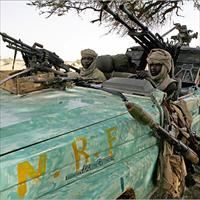DRC: Concern over IDPs amid claims of rebels seizing town

Concern is growing over the fate of an estimated 30,000–40,000 internally displaced people (IDPs) in Nyanzale in North Kivu, eastern Democratic Republic of Congo, after mobile phone communications between the town and the provincial capital of Goma were cut on 3 December, the UN said.
Nyanzale came under attack by forces loyal to dissident general Laurent Nkunda on 2 December, but the UN said it could not confirm whether or not rebels loyal to Nkunda had captured the town, 100km north of Goma.
"Communications are lost in Nyanzale today; the [Congolese] military told us Nkunda took over one of the main transmitters in the area, so we don’t have any communication with humanitarian staff that are based in Nyanzale," said Louis Vigneault, a spokesman with the UN Office for the Coordination of Humanitarian Affairs (OCHA).
"There are a lot of people who fled north of Nyanzale towards Kanyabayonga," Vigneault said. "But there would still be quite a lot of people in Nyanzale."
Rebels on 3 December said they still held the town, and called the attack a defensive manoeuvre.
"From that base they used to shell our positions," René Abandi, Nkunda's spokesman, told IRIN. "It was necessary to destroy that base because they were attacking us from there."
Fighting continued on 3 December as the Congolese Armed Forces attacked the rebel stronghold of Mushake, about 40km west of Goma.
"As of this morning 5:30 [local time], the government troops launched their operations against Nkunda loyalists in the area of Mushake,” a military spokesman for theUN Mission in the Congo (MONUC), Maj Vivek Goyal, told IRIN. "They have used their artillery and their attack helicopters have flown."
Congolese army officials were not available for comment.
A spokesman for Nkunda said the attack on Mushake was expected. However, he did not offer further details on the fighting.
Nkunda, an ethnic Tutsi, broke ranks with the Congolese army in 2004, claiming that not enough had been done to neutralise Rwandan Hutu militias known as the Forces Démocratique de la Libération du Rwanda (FDLR,) which have ties to the perpetrators of Rwanda’s 1994 genocide.
Nearly 400,000 people have been displaced by fighting since late 2006, while incidents of sexual violence and recruitment of children into armed groups have soared.
 Back and Next - Back and Next
Back and Next - Back and Next See Also - See Also
See Also - See Also